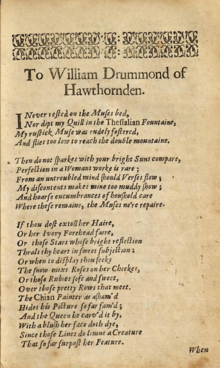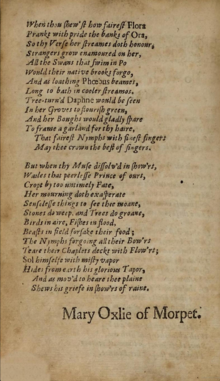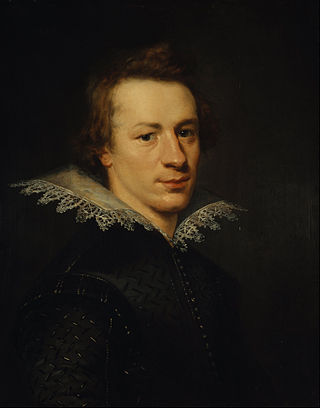

Mary Oxlie or Oxley (fl. 1616) was a 17th-century Scottish or Northumbrian poet, known for one surviving published composition, a "literary eulogy or friendship poem". [1]


Mary Oxlie or Oxley (fl. 1616) was a 17th-century Scottish or Northumbrian poet, known for one surviving published composition, a "literary eulogy or friendship poem". [1]
Mary Oxlie of Morpeth is credited as the author of a commendatory poem of fifty-two lines, "To William Drummond of Hawthornden," which prefaced Edward Phillips' 1656 edition of Drummond's poems. Phillips was Drummond's brother-in-law. [2]
In 1675, in a section of his Theatrum poetarum called "Women among the moderns eminent for poetry," Phillips describes "Mary Morpeth" as a "Scotch Poetess" who wrote "many other things in Poetry" (p. 259) apart from the dedication, though none of these other poems are now known. The 1656 ascription identifies her as Northumbrian. The original date of the poem is conjectural, though from internal evidence it would seem to have been 1616. [2]
She, along with other women such as Anna Hume, may have been part of the Hawthornden literary circle or coterie: Phillips terms her "a friend of the Poet Drummond" (p. 259). [2]
She may have also been the author of two occasional poems published as broadsides and signed "M.M.", though the source texts have been lost. [3]
Oxlie's dedicatory poem opens with formulaic humility:
I Never rested on the Muses bed,
Nor dipt my Quill in the Thessalian Fountaine,
My rustick Muse was rudely fostered,
And flies too low to reach the double mountaine. (1-4)
The second verse clarifies that this "rusticity" is due in large part to the particular situation of the woman writer:
Perfection in a Woman's worke is rare
From an untroubled mind should Verses flow;
My discontents makes mine too muddy show;
And hoarse encumbrances of household care
Where these remaine, the muses ne're repaire. (6-10)
Despite these caveats, the poem itself is generally agreed to be an accomplished pastoral that offers insight into the coterie culture of the period. The poem praises Drummond's skill as writer of flattering verse addressed to women but reserves greater adulation for his evocation of sorrow at the death of the "peerless prince" Henry Frederick, Prince of Wales. Drummond, she wrote, might extinguish the sun's glorious taper and bring showers of rain. [2]
But when thy Muse dissolv'd in show'rs,
Wailes that peerlesse Prince of ours,
Cropt by too untimely Fate,
Her mourning doth exasperate
Senselesse things to see thee moane,
Stones do weep, and Trees do groane,
Birds in aire, Fishes in flood,
Beasts in field forsake their food;
The Nymphs forgoing all their Bowers
Teare their Chaplets deckt with Flowers;
Sol himselfe with misty vapour
Hides from earth his glorious Taper,
- And as mov'd to heare thee plaine
- Shews his griefe in show'rs of raine. (39-52) [4]
Oxlie's poem was anthologized in 1921 by J. C. Squire in A Book of Women’s Verse [5] and more recently by Germaine Greer in 101 Poems by 101 Women (2001) [6] and Jane Davidson and Peter Stevenson in Early Modern Women Poets (2001). [3]

Benjamin Jonson was an English playwright and poet. Jonson's artistry exerted a lasting influence on English poetry and stage comedy. He popularised the comedy of humours; he is best known for the satirical plays Every Man in His Humour (1598), Volpone, or The Fox, The Alchemist (1610) and Bartholomew Fair (1614) and for his lyric and epigrammatic poetry. He is regarded as "the second most important English dramatist, after William Shakespeare, during the reign of James I."

William Drummond, called "of Hawthornden", was a Scottish poet.
The Oxford Book of English Verse, 1250–1900 is an anthology of English poetry, edited by Arthur Quiller-Couch, that had a very substantial influence on popular taste and perception of poetry for at least a generation. It was published by Oxford University Press in 1900; in its india-paper form it was carried widely around the British Empire and in war as a 'knapsack book'. It sold close to 500,000 copies in its first edition. In 1939, the editor revised it, deleting several poems that he regretted including and adding instead many poems published before 1901 as well as poems published up to 1918. The second edition is now available online.

William Alexander, 1st Earl of Stirling PC was a Scottish courtier and poet who was involved in the Scottish colonisation of Charles Fort, later Port-Royal, Nova Scotia in 1629 and Long Island, New York. His literary works include Aurora (1604), The Monarchick Tragedies (1604) and Doomes-Day.
Elizabeth Daryush was an English poet.
William Fowler was a Scottish poet or makar, writer, courtier and translator.

The Nine Muses, Or, Poems Written by Nine severall Ladies Upon the death of the late Famous John Dryden, Esq. was an elegiac volume of poetry published pseudonymously. The contributors were English women writers, each of whom signed their poems with the name of one of the Muses. The collection was edited by Delarivier Manley and includes pieces by Susanna Centlivre, Sarah Fyge Egerton, Mary Pix ("Clio"), Catherine Trotter ("Calliope"), and Sarah Piers ("Urania"). The poet writing as "Polimnia" has not been identified; her initials are "Mrs. D. E."
Sarah, Lady Piers was an English literary patron, political commentator, and a poet.

Lucy Hastings, Countess of Huntingdon, born Lucy Davies, was a seventeenth-century English poet. Her poems were not published in her lifetime. She had ten children including Elizabeth and the 7th Theophilus Hastings.

Alicia D'Anvers [née Clarke] was an English poet known for her satires of academic life.

Elizabeth Egerton, Countess of Bridgewater was an English writer who married into the Egerton family.

Elizabeth Thomas was a British poet and letter writer. She was part of an important artistic group in London and John Dryden named her "Corinna". However, she suffered from lifelong financial precarity, romantic disappointment, and latterly, health problems. Her reputation was damaged by Alexander Pope and she spent three years in a debtor's prison near the end of her life.
Nationality words link to articles with information on the nation's poetry or literature.
Nationality words link to articles with information on the nation's poetry or literature.
Nationality words link to articles with information on the nation's poetry or literature.
Mary, Lady Cheke was an English courtier, poet, and epigrammatist. She served as lady of the privy chamber to Elizabeth I.
Alice Sutcliffe, born Alice Woodhouse or Woodhows, was an English religious writer. Her only known literary work, Meditations of Man's Mortalitie, or, A Way to True Blessednesse, was first published in 1633.
Elizabeth Taylor was a British poet of the Restoration period.